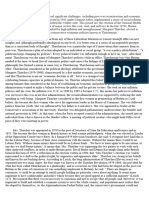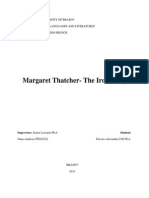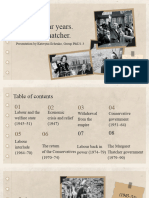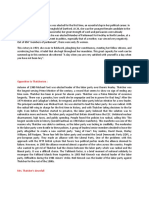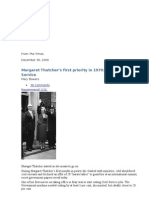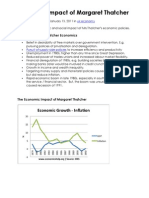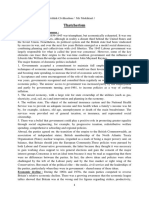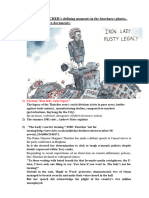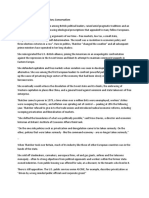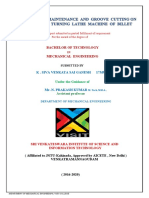Unit 10
The Thatcher Revolution: The Boom Years 1985 to 1990
Privatisation
Thatcher’s policy was one of ‘small government’. She wanted to undo the ‘state corporatism’ of the
consensus years, reverse nationalisation, and get government out of businesses and to leave them to
the markets. Some of the main businesses she sold were:
● British Telecom (BT)
● British Airways (BA)
● British Steel
● British Gas
This made the government a good deal of short-term money, to supplement the windfall from North Sea
oil and gas.
It also made many people shareholders, and made them money too, as all the companies’ share prices
rose after being sold off.
Macmillan however, described privatisation as ‘selling off the family silverware’.
Deregulation
On 27 October 1986 the City of London financial centre was deregulated.
The new, more open, laws attracted new international banks to London, transforming ‘The City’ over the
following decade from a regional banking centre to a world financial centre rivalling Wall Street.
This change was later called ‘The Big Bang’.
Whereas the manufacturing sector was devastated under Thatcher, the service sector boomed.
It changed the way British people work.
Occupation Changes in Britain
‘I think we have gone through a period when too many children and people have been given to
understand "I have a problem, it is the Government's job to cope with it!" or "I have a problem, I will go
and get a grant to cope with it!" "I am homeless, the Government must house me!" and so they are
casting their problems on society and who is society? There is no such thing! There are individual men
and women and there are families and no government can do anything except through people and
people look to themselves first. It is our duty to look after ourselves and then also to help look after our
neighbour and life is a reciprocal business and people have got the entitlements too much in mind
without the obligations.’
Margaret Thatcher: Woman’s Own, 1987
�The enterprise culture
Thatcher wanted to break the ‘dependency’, ‘entitlement’, or ‘victim’ mentality which she saw in society,
and replace it with an ‘enterprise culture’.
Lord Young, one of Thatcher’s ministers, said:
‘The real danger is of killing individual responsibility through care. I believe that over the decades,
government has gradually set up a culture of dependency which has displaced individuals’
responsibilities... We must have an enterprise culture, not a dependency culture.’
Thatcher’s policy was:
● Stabilise the economy
● Privatise and deregulate
● Encourage ‘free enterprise’…and...
Attacking the welfare state
Thatcher also felt that the growth of welfare, rather than just helping those who deserved it, had created
a ‘welfare mentality’ which discouraged personal responsibility.
There was certainly much abuse of the welfare system.
She encouraged reform in two ways:
● She encouraged management restructuring and someprivatisation – certainly internal markets –
in the National Health Service (NHS), in order to improve efficiency and service.
● She introduced a social security benefits review, which made it more difficult to become
dependent on benefits.
Both policies were very controversial.
The third Thatcher government 1987-90
As the economy was starting to boom in 1987, Thatcher called another general election in June.
Despite an improvement in the Labour party image, she again won a majority of over 100 seats, but her
popularity didn’t last long.
The main issues in this government were:
● The consumer society
● The ‘poll’ tax
● Division over Europe
● The fall of Thatcher
The consumer society
Tax cuts were one of Thatcher’s priorities, and the budgets of 1987 and 1988 extended these.
Deregulation of banks also meant that credit was now much easier to get hold of – for houses, cars and
consumer goods.
Together, these two changes boosted spending power and consumption and caused a consumer boom.
Austerity in the 1940s had been followed by steady growth in the 1950s, with Macmillan saying ‘You’ve
never had it so good’. Now, the despondency of the 1970s, and mass unemployment of the early 1980s,
was being replaced, not only by greater affluence, but also by the ‘buy now, pay later’ mentality.
In 1989, Thatcher celebrated 10 years in office, and everything seemed to be going well at last, and she
was heading for ‘10 more years’.
The ‘poll’ tax
The rates system for paying local taxes was much criticised.
�Thatcher decided to replace it by the Community Charge – a ‘poll tax’ in which, rather than just home
owners paying, according to the size of the house they owned, everyone, home owner or not, would now
pay the same – whether rich or poor.
It fitted Thatcher’s value of ‘personal responsibility’ – but the change, in effect, caused the poor to give to
the rich.
When introduced in Scotland, a year before England, many, including MPs, refused to pay and were
jailed!
Despite pleas from her cabinet to stop it, she pressed on.
Just before its introduction in England, there was a demonstration of 70,000 in London, which developed
into the biggest riot for a hundred years.
Thatcher was seen as being unhearing and uncaring.
Division over Europe
This was also the time when Thatcher was having her ideological battle with Jacques Delors over the
future of Europe.
She was determined to keep Britain’s independence, especially with ‘the pound’.
However, her chancellors, Nigel Lawson, followed by Geoffrey Howe, both felt Britain’s best interests
were by joining the Exchange Rate Mechanism (ERM). They both, in turn, resigned over the issue.
After resigning, Howe gave a speech in parliament about Thatcher’s dangerous European policies and
how they would damage Britain. Coming from such a senior minister, this seriously damaged her
credibility.
The fall of Thatcher
Soon after, Michael Heseltine, a pro-European Tory, and very popular leader, who had fallen out with
Thatcher in 1986, challenged her for the leadership.
Thatcher failed to win by enough votes in the first round, and so a second round was needed, in which
Thatcher said she would stand.
However, when she consulted her ministers, she describes in her memoirs how most gave her a
previously agreed answer ‘I will support you, but I don’t think you’ll win’. She realised she had lost the
support of her cabinet, and saw this as a betrayal and plot to overthrow her. She was probably right.
Her unpopularity had caused the Labour party to develop a big lead over the Conservatives in opinion
polls. Many Tories felt that, if they kept Thatcher, they would lose the next election – so they ditched her.
On 22nd November 1990, Thatcher resigned.
The legacy of Thatcher
On Thatcher’s departure from Downing Street, she said ‘We are very happy that we leave the United
Kingdom in a very very much better state than when we came here eleven and a half years ago.’
Certainly Britain was ‘stronger, richer, and more self confident’ (Marr), but did she fulfill her own promise?
● Discord vs harmony.
● Error vs truth.
● Doubt vs faith.
● Despair vs hope.
People either loved her, or hated her – there is not much middle ground.













